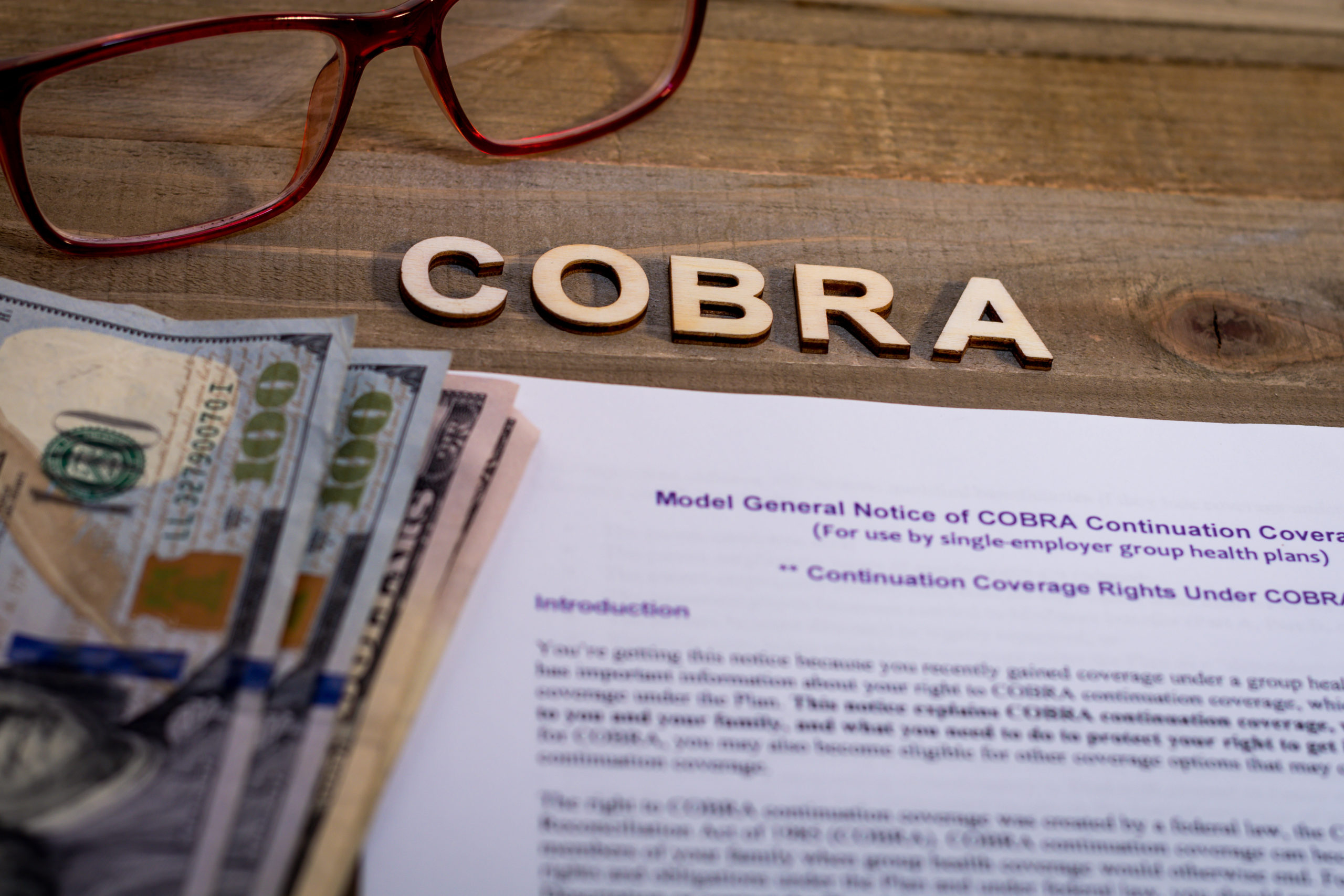In March of 2021, President Biden signed the American rescue plan act into law. The law requires that those who are entitled to COBRA coverage anytime between 4/1/2021 through 9/30/2021 due to a loss of coverage under a group health plan resulting from involuntary loss of employment or reduction of hours, be provided with a full (100%) subsidy for their Cobra premium due with this period. COBRA is an acronym for the Consolidated Omnibus Budget Reconciliation Act, the federal law that also amended ERISA to enable temporary health insurance for people who have lost or left their jobs. The law took effect in 1985. As a result of the new law, individuals may not be charged for a COBRA premium within this period. Instead, the employer can recover the government’s premium subsidy through quarterly employment tax credits. The following are some FAQ for the employer…
What Types of Loss of Coverage Events Qualify for 100% Subsidy?
If a person loses group health coverage from involuntary loss of employment or involuntary reduction of hours he would be an “Assistance Eligible Individuals-”
What Types of Loss of Coverage Events Do Not Qualify?
All events other than involuntary loss of employment or hours do not qualify.
What Types of Benefits Qualify?
Medical, dental, and vision must be provided under a group health plan. Health flexible cafeteria plans do not qualify.
Are Qualified Beneficiaries Entitled to the Subsidy?
If the covered employee is entitled to the subsidy all his beneficiaries will also be qualified.
Are There Extended Election Periods?
Significantly, ARPA lengthens the COBRA election period and allows individuals whose COBRA election period expired before April 1, 2021, to elect subsidized COBRA coverage beginning April 1, 2021, so long as the individual otherwise qualifies as an AEI (An AEI is any qualifying plan participant) and remains eligible for COBRA coverage during (some or all of) the six-month subsidy period. This special enrollment opportunity also allows AEIs who previously declined COBRA, or elected but then terminated their COBRA coverage (such as due to premium nonpayment), the ability to elect subsidized COBRA coverage beginning April 1, 2021.
Although the election period has been extended and broadened to include more individuals who may qualify for subsidized COBRA coverage, ARPA does not extend the maximum COBRA coverage period (generally 18 months). Employers would be well advised to begin identifying those individuals who fall into this category, so that they may timely provide notice to affected AEIs.
Who is Entitled to Receive the Subsidy?
Professional employer organizations (PEOs) offer services ranging from payroll processing, benefits administration, HR training and support, and workplace insurance coverage, to both small and medium-sized businesses. The PEO for multi-employer Group Plans can receive the subsidy.
The employer subject to COBRA and the employer for partially or completely Self-Funded group loans
Fully funded group plans for employers with less than 20 employees. The insurer for fully-funded group plans not otherwise subject to COBRA.
How is the Subsidy Received?
Employers will obtain the subsidy through a payroll tax credit against employers’ quarterly taxes and will be responsible for paying health insurance carriers for the premiums. Assistance Eligible Individuals do not have to pay any of the COBRA premia for the period of coverage from April 1, 2021, through September 30, 2021. The premium is reimbursed directly to the employer, plan administrator, or insurance company through a COBRA premium assistance credit.
What About the 2% Administrative Fee?
The PEO/employer can recoup the subsidy received from the government and will be charged a 2% administrative fee. However, the PEO/employer may seek tax credit or overpayment refund from the government of the full 102% premium paid.
What Happens to the Existing COBRA Participants?
A COBRA participant who would have a premium payment due between April 1, 2021, and September 30, 2021, will be entitled to a full subsidy for their COBRA coverage falling within those months. The Act does not change the maximum amount of time available of COBRA Coverage which is 18 months.
What Notices Need to be Issued Regarding the ARPA and is There a Penalty for Non-compliance?
Plan/administrators shall issue election notices or a supplement to election notices, which advise of the premium assistance. The option to enroll is a different plan if provided by the employer. Notice of extended election periods. and notice of expiration of premium assistance period. To avoid the risk of non-compliance after April 1, 2021 loss of employment or reduction of hours may have defaulted to non-voluntary when not otherwise marked by the employer.
What If the Employee Had a Qualifying Event Before April 1, 2021?
Employers will need to audit their records back to 11/1/2019 to determine whether any employees were involuntarily terminated or had their hours reduced and contact them too and notify them of their COBRA rights under this law.
As an Employer What Can I Expect From My COBRA Carrier?
As an employer, you will need to pay for the full cost of the COBRA coverage for eligible employees to your insurance carrier. You will recoup that cost through quarterly employment tax credits. It is your responsibility to ensure the premium payment are paid on time and coverage does not lapse.
Why Must Employers Go Back to 11/1/2021 to Notify Employees?
Because COBRA eligibility period spans 18 months. If an employee lost coverage during that 18 months they may be eligible for subsidy.
The Department of Labor is required to provide Model Notices within 45 days of enactment of the Act.
Contact us (859-817-2280) for a Free Consultation/Quote!
Demo Our HCM Suite
View The Power of Our Fully Integrated Human Capital Management Suite
—
 About Payroll Partners
About Payroll Partners
As a leading payroll provider, we offer comprehensive solutions designed to fit your business. Our knowledgeable and experienced staff offers confidential and reliable assistance for every aspect of payroll. Count on us to deliver accurate and timely payrolls while accommodating your unique needs. From meeting your basic payroll requirements to management reports, and/or tax pay and file services, we can do it all.
> Learn More
- Human Resources
- Recruiting
- Onboarding
- Benefits
- Performance
- Succession
- Compensation
- Time & Attendance
- Scheduling
- Leave
- Payroll & Tax
